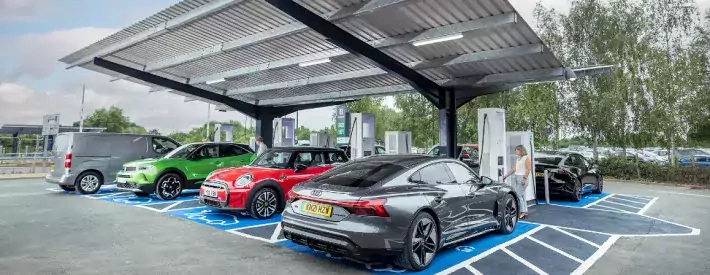EVs aren’t the problem, humans are

Why charging anxiety may be fuelled by human insecurity, not the EV network or limitations on an EV’s range
Range anxiety has been written and spoken about since EVs came to the market. But what if the problem wasn’t how much juice you can store in a battery – and how long it’ll take you – but our own mindsets?
Volkswagen Financial Services UK research shows that 55% of Brits panic if they know their phone or laptop will run out of battery, which suggests that charging anxiety among EV considerers could be influenced more by human psychology than scepticism about the UK’s public charging network.
The worry varies for different groups, so VW’s findings reveal that Gen Z and Millennials (77%) are most likely to panic if their personal device were to run out of battery. However, this age group are most likely to be prepared by owning a portable charger (68%).
Despite an uneasy disposition to low battery life, younger people are more convinced than any other generation that electric cars will benefit the environment, with 66% of 18 – 24 year olds believing this to be true. Only 22% of this age group said they were not convinced, compared to 44% of people aged 65 – 74 and 36% of over 75s.
The charging conundrum
But while discharging the battery may be the biggest concern when it comes to EVs, it’s closely followed by concerns around the current public charging network.
Three in 10 people (31%) believe there aren’t enough charging points in the areas where they live and work. But, and this is a big but, if we consider the average length of each car journey in the UK is fewer than 10 miles, this could be another reflection of the nation’s skewed attitudes to battery life.
Volkswagen Financial Services UK data shows that 75% of people would expect their electric vehicle to travel up to 300 miles on a single charge, and as an example, the all-electric Volkswagen ID.3 can travel up to 340 miles on a single charge, which is in line with WLTP (combined) data.
Add to this that 88% of people ensure their devices – phones, tablets and watches for example – are fully charged before leaving home, with over half deciding to charge their devices overnight as well as using battery saver modes (55%), why couldn’t EV owners fall into the same habits for their vehicles?
This fuels food for thought that home charging points would be the most beneficial option for many electric car drivers, but with factors such as lack of off-road parking for some households, and rising energy prices, more needs to be done to address this to aid a wider transition to electric.
When questioned about their expectations for charging times before resuming a journey, 32% of respondents said they would be prepared to wait up to an hour, with just 12% saying they would be happy to wait for longer.
Indeed, 32% said they would only pause journeys for 30 minutes to charge their EV, and just over one in ten (12%) wanted the waiting time to be less than 10 minutes.
Mike Todd, CEO at Volkswagen Financial Services UK, said: “The findings of our research make for interesting reading at a critical time for the automotive industry. Forecasts by the Competition and Markets Authority suggest that up to 480,000 public charging points will be required across the UK by 2030 but it seems this roll-out needs to happen more quickly to encourage the majority of would-be EV drivers to make the switch to electric.
“However, with public charging stations being installed at supermarkets, gyms and elsewhere, frequent top-ups rather than big weekly charges are likely to be the best way forward for many, especially those without off-street parking. This research shows how ingrained our devices and battery lives are in our everyday lives, and I believe charging an EV should be approached in the same way we top up a smartphone battery – something that’s much easier if you have multiple chargers within close proximity.”
Customer understanding of EVs and the charging options – and habits – is down to the automotive industry making sure they fully inform people walking into dealerships.
Quentin Willson, former Top Gear presenter and founder of the FairCharge campaign, said: “Many people don’t realise that Lithium-ion EV batteries are completely different to the batteries in our phones and laptops and so we need to educate new adopters to think differently about battery life, reliability and charging. There are many EVs that now do 200 to 280 miles on a single charge and batteries in some of the earliest EVs are outlasting the chassis of the car. Just look at our roads and you’ll see that hundreds of thousands of EV drivers have folded electric cars into their lives and successfully use them without anxieties.
“Graze charging is now a thing, where people charge at home, top up at work, then again at the gym and also at the supermarket. I think charging anxiety really exists mainly among EV considerers as opposed to EV drivers. We don’t have petrol stations at the end of our roads or fuel pumps in our driveways. Even with our current infrastructure - which needs to improve - we can see that EV drivers are managing.”




